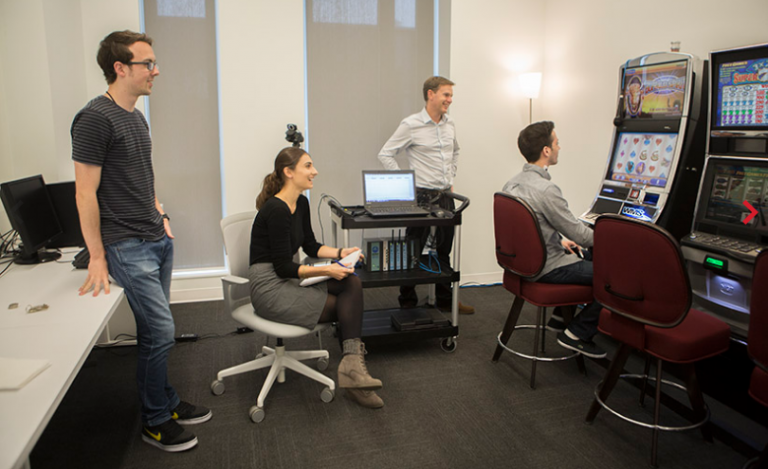

The Centre for Gambling Research at UBC. (Photo: Della Rollins)
Understanding the psychology of gambling and improving evidence-based gambling policy are key drivers behind the research at the Centre for Gambling Research at UBC. The Centre explores the cognitive, behavioural, clinical and neuroscience aspects of gambling,
Since it was established in 2014, the Centre – one of only a handful of gambling research hubs globally – has transformed gaming research in British Columbia. Dr. Luke Clark, psychology professor and the Centre’s director, is focused on understanding the neural and psychological basis of distorted styles of thinking during gambling, and the relevance of these processes to problem gambling.
We sit down with Dr. Clark to probe the psychology of gambling, to learn more about his research, and to find out what the members at the Centre do for fun. Hint, they work hard and play hard.
Let’s start with a big question. Why do people gamble?
The most intuitive answer to that question is “to win money”, but gambling games are generally set up so that the gambler is more likely to lose money, particularly over time. So gambling is an interesting paradox for researchers interested in decision-making. A lot of our research looks at different psychological distortions that occur during gambling games, where players think they are more likely to win than they actually are.
What’s the main research focus of the Centre for Gambling Research at UBC?
The Centre opened in 2014, and since then our research has honed in on three main programs. The first is looking at modern slot machines, which we believe are one of the most harmful forms of gambling. In our Casino Lab, we have several authentic slot machines, and our experiments are trying to disentangle how these machines become addictive for some people. The second line of work is looking at online gambling on the BCLC’s PlayNow website – this is an amazing opportunity to translate our lab experiments to using “big data” from the field. And the third line is continuing the work that I started in the UK on the neuroscience of gambling addiction, using brain imaging methods including fMRI and PET imaging.
When and why did you first develop an interest in understanding gambling disorders?


Luke Clark
I’ve worked across a few areas of cognitive neuroscience before I began to focus on gambling, but all of my research has broadly been interested in how the brain evaluates risk and makes decisions, and how those abilities are affected by mental illness. Problem gambling isn’t a topic that features in most undergraduate courses (other than mine!) but once I started to explore the topic, I realized it was an ideal model for answering those questions.
What kinds of questions do you try to answer?
One of the main objectives of the Centre is to improve gambling policy, so in our experiments looking at slot machine gambling and online gambling, we’re always trying to think how these forms of gambling could be adapted in future to make them safer for gamblers. Are there certain ingredients of these games that are actually dangerous, or are there other ways that we can encourage players to control their gambling more effectively, for example through setting limits?
Can you tell us about any new research that you are particularly excited about?
Several of our experiments in the Casino Lab have been looking at immersion in slot machine games. One theory for why some gamblers play slot machines to excess is that they enter a “zone” where they lose track of what’s happening around them. This is not an easy state to measure. My grad student Spencer Murch has been studying this with an attention dual-task design, and we see that people with more problematic gambling tend to report more immersion, and miss more attentional stimuli happening in the edge of their visual fields. This opens up a whole host of important questions for understanding problem gambling and slot machine design.
What are other members of the lab working on?
There are a lot of projects on the go! One line of work by my MA student Mario Ferrari is looking at the role of testosterone in gambling. We mainly think of testosterone as being involved in social competitions, but some gamblers actually treat slot machines as if they’re in a competition against a human opponent, so testosterone may also play a role. Another line of work by my post-doc Eve Limbrick-Oldfield is looking at the role of money in gambling: are players more or less risky when playing with physical cash, or on credit? This is another really important issue for gambling policy.
Can you describe the personality of the lab?
I asked the lab this one, and the best answers were ‘multiple’ and ‘caffeinated’. Several of us in the lab are film buffs, and as gambling is a topic that is very much in the public eye, there are a lot of classic movies about gambling. We’ve really enjoyed running a film series where we screen the movie in the lab, and then discuss it afterwards – for example, does the movie glamourize gambling or portray problem gambling in an accurate light? We’ve covered Rounders, The Gambler, and Mississippi Grind recently, and we’re always looking for suggestions for movies that we haven’t covered. See our Gambling in the Movies blog to read our reviews.
What does the lab do for fun?
Well, this is UBC, so we’re a lab that works (quite) hard and plays hard. As a gambling lab, it’s essential that we have regular field trips to the local casinos to keep up to date with new types of slot machines (seriously!), and we do a few lab outings each year where we’ve hiked up the Chief, we’ve been curling and paddle-boarding, and we’ve done an escape room. Next up is skating at Robson Square.


